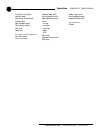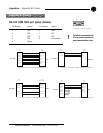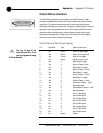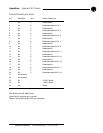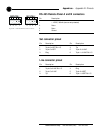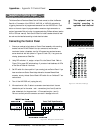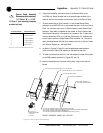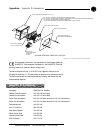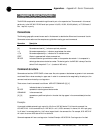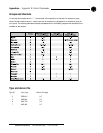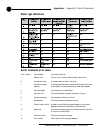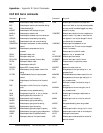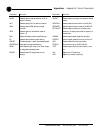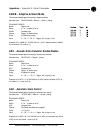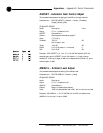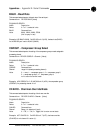
94
Technical Services Group ~ 1-800-283-5936 (USA) ~ 1-801-974-3760
Appendices ~ Appendix E: Serial Commands
The XAP 800 accepts serial commands through the serial port or the expansion bus. The commands in this manual
pertain only to the XAP 800. RS-232 serial port protocol is 9,600, 19,200, 38,400 (default), or 57,600 baud; 8
bits, 1 stop bit, no parity.
Conventions
The following typographic conventions are used in this document to describe the different serial commands. Use the
Command structure section and the examples as a guide when creating your serial commands.
Convention Description
<X> Parameters enclosed in < > indicate a mandatory parameter.
[X] Parameters enclosed in [ ] indicate an optional parameter.
1-8 Parameters separated by a - indicate a range between the values.
4,7,9 Parameters separated by a , indicate a list of available values.
EREF
Words in uppercase bold indicate command text.
DEVICE Indicates the device type and device number on the expansion bus network. It is composed of a
device type character and a device number. The device type for the XAP 800 is always 5 and the
device ID will always be 0–7, or * (to select all 800 units).
Command structure
Commands can be either UPPER CASE or lower case. Also, extra spaces or tabs between arguments in text commands
are allowed. Return values are always in upper case. In order for a command to be recognized by the serial port, the
command must be terminated by a carriage return.
The structure of serial commands is as follows: #DEVICE
COMMAND
[X] [X]
# indicates the start of a command line
DEVICE represents the device type and device number
COMMAND
is the command text
[X] [X] represents any additional options in the order that they appear in the command descriptions that
follow
Example
A command to disable automatic gain control for Mic 2 on a XAP 800 device "0" will have the command line:
#50 AGC 2 M 0. In this command line, 5=XAP 800, 0=unit 0, AGC=command, 2=channel, M=Mic Input group,
0=off state. If a command calls for a "null" value, leave a blank in the command line. For example, "#50 AGC 2 M"
will return the current AGC state of Mic 2 on device 50.
Command responses will have a carriage return line feed. Example: #50 AGC 2 M O carriage return line feed.
Appendix E: Serial Commands



